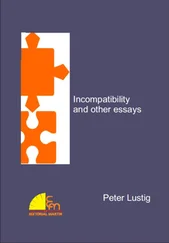It is symptomatic of our particular epoch that the success of a single day can become a “subject” (or a reproach). Consider that in times gone by more importance was attached to faith in a correctly chosen moment, which could indeed stand for the whole of life. Faith? Belief? Idea? In the remote past, at all events, regardless of whether you were herding sheep on the slopes of Pindus, strolling about below the Acropolis, or building a wall on the stony plateau of Arcadia, you had to reckon with a god of the right moment or time-atom, a god in any case. And in its day, no doubt, this god of the moment was more powerful than all seemingly immutable embodiments of gods — always present, always here, always valid. But in the end he, too, was dethroned — or, who knows? — mightn’t it have been your god of “now!” (and of the eyes that meet, and of the sky which, formless only a moment ago, suddenly took on form, and of the water-smooth stone, which suddenly showed the play of its colors, and, and) that was dethroned by the faith that came after — no longer image or idea, but faith “born of love” in a new Creation, in which all moments and epochs are fulfilled through the Incarnation, death, and Resurrection of the Son of God, and thus in so-called eternity, a gospel whose missionaries proclaimed first that it was not made to the measure of man, and second that those who believed in it would transcend the mere moments of philosophy and enjoy the aeons, or, rather, the eternities of religion. There then followed, distinct from both the god of the moment and the God of eternity, though without sufficient zeal to demolish the one or the other, a period of purely immanent, or, to state it plainly, secular power, which put its reliance — your kairos-cult, your Greeks, your heavenly beatitude, your Christians and Muslims mean nothing to me — on something intermediary, on the success of my here-and-now, of the successful individual lifetime. Faith? Dream? Vision? Most likely — at least at the start of this period — a vision: the vision of people who have been disillusioned with all faith of any kind; a sort of defiant daydream. Since nothing outside me is thinkable, I will make the utmost of my life. Thus the era of this third power was superlative in word and deed: labors of Hercules, world movements. “Was”? Does it follow that this era is past? No, the idea of a whole life made successful by activity is of course still in force and will always remain fruitful. But apparently there is little more to be said about it, for the epics and romances of adventure of the pioneers, who resolutely lived the original dream of the active life, have already been told and provide the models for today’s successful lives — each one a variant of the well-known formula: Plant a tree, get a child, write a book — and all that’s left to talk about are strange little variations or glosses, tossed off at random, something for example about a young man of thirty, married to a woman whom he was confident of loving to the end, a teacher at a small suburban school, to whose monthly magazine he contributed occasional theater or movie notes, who had no further plans for the future (no tree, no book, no child), telling friends, not only since the completion of his thirtieth year, but on his last few birthdays as well, with festively lit-up eyes, of his certainty that his life had been successful (the words sound even weirder in the French original, “j’ai réussi ma vie”—“I’ve made a good thing of my life”?). Was the epochal vision of the successful life still at work in this man of today? Was his statement still an expression of faith? It is a long time since those words were spoken, but in my imagination, regardless of what may have happened to the man since, I feel sure that if anyone asks him he will still automatically give the same reply. So it must be faith. What sort of faith? — What can have become of that young “successful life”?
Do you mean to imply that, unlike successful lives, your so-called successful day is more meaningful today than any mere glosses or copies or travesties? Is it so very different from the motto from the Golden Age of Rome, “carpe diem,” which today, two thousand years later, can serve equally well as a brand of wine, an inscription on a T-shirt, or the name of a nightclub. (Once again it all depends on how you translate it: “Make the best of your day”—as it was understood in the century of action—? “Gather the day”—whereby the day becomes one great favorable moment—? or “Let the day bear fruit”—whereby Horace’s famous dictum suddenly comes close to my today-problem—?) And what is a successful day anyway — because thus far you have only been trying to make clear what it is not? But with all your digressions, complications, and tergiversations, your way of breaking off every time you gain a bit of momentum, what becomes of your Line of Beauty and Grace, which, as you’ve hinted, stands for a successful day and, as you went on to assure us, would introduce your essay on the subject. When will you abandon your irresolute peripheral zigzags, your timorous attempt to define a concept that seems to be growing emptier than ever, and at last, with the help of coherent sentences, make the light, sharp incision that will carry us through the present muddle and in medias res, in the hope that this obscure “successful day” of yours may take on clarity and universal form. How do you conceive of such a day? Give me a rough sketch of it, show me a picture of it. Tell me about this successful day. Show me the dance of the successful day. Sing me the song of the successful day!
There really is a song that might have been called “A Successful Day.” It was sung by Van Morrison, my favorite singer (or one of them), and it actually has a dif ferent title, the name of a small American town that is otherwise of no interest. It tells the story in pictures of a car ride on a Sunday — when a successful day seems even more unlikely than on any other day of the week — rbr two, a man and a woman, no doubt, in the we-form (in which the success of a day seems an even greater event than for one person alone): fishing in the mountains, driving on, buying the Sunday paper, driving on, a snack, driving on, the shimmer of your hair, arriving in the evening, with roughly this last line: “Why can’t every day be like this?” It’s a very short song, maybe the shortest ballad ever, it hardly takes a minute, and the man who sings it is almost elderly, with a few last strands of hair, and it talks more than it sings about that day, without tune or resonance, in a kind of casual murmur, but out of a broad, powerful chest, suddenly breaking off just as it swells its widest.
Nowadays, the Line of Beauty and Grace might be unlikely to take the same gentle curve as in Hogarth’s eighteenth century, which, at least in prosperous, self-sufficient England, conceived of itself as a very earthly epoch. Isn’t it typical of people like us that this sort of song keeps breaking off, lapsing into stuttering, babbling, and silence, starting up again, going off on a sidetrack — yet in the end, as throughout, aiming at unity and wholeness? And isn’t it equally typical of us late-twentieth-century people that we think about a single successful day rather than some sort of eternity or an entire successful life — no, not only in the sense of “Live in the present,” and certainly not of “Gather ye rosebuds,” but also in the urgent, needful hope that by investigating the elements of this one period of time one might devise a model for a greater, still greater, if not the greatest possible period, because now that all the old ideas of time have gone up in smoke, this drifting from day to day without rule or precept (except perhaps with reference to what one should not do in one’s lifetime), devoid of ties (with you, with that passerby) or the slightest certainty (that the present moment of joy will be repeated tomorrow if ever), though bearable in youth, when it may even be accompanied or encouraged by carefreeness, gives way in time to more frequent dissatisfaction and, with advancing age, to indignation. And since age, unlike youth, cannot rebel against heaven, against present conditions on earth, or anything else, my indignation turns against myself. Damn it, why aren’t we together anymore? Why at three o’clock this afternoon has the light in the country lane, or the clatter of the train wheels, or your face ceased to be the event it was this morning and promised to remain forever and ever. Damn it, why, quite unlike what is supposed to happen as one grows older, am I less able than ever to remember, hold fast, and treasure the moments of my life? Damn it, why am I so scatterbrained? Damn, damn, damn. (And while we’re at it, look at those gym shoes drying on the windowsill of the gabled house across the street; they belong to the neighbor kid we saw last night in the floodlight of the makeshift football field, plucking at the seam of his jersey while running to intercept a pass.)
Читать дальше












